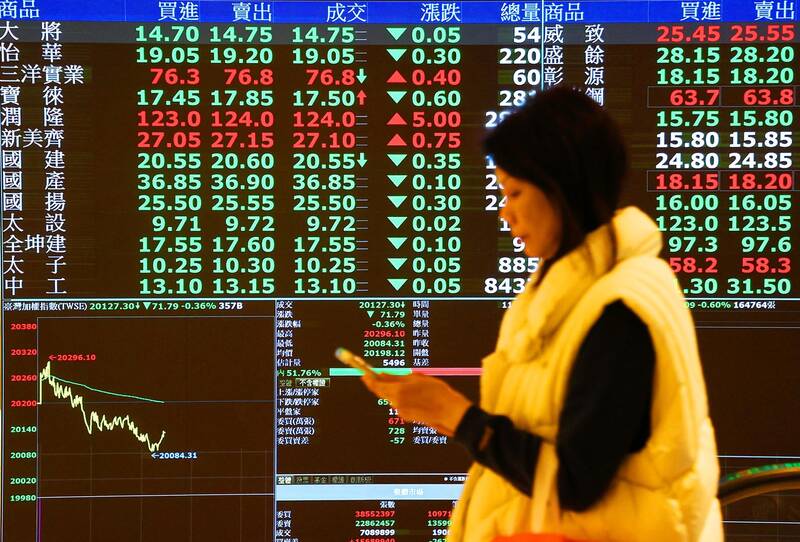The TAIEX yesterday plunged 3.81 percent, or 774 points, to 19,527.12 after Taiwan Semiconductor Manufacturing Co (TSMC, 台積電) on Thursday trimmed its forecast for global chip demand this year and an apparent Israeli retaliation against Iran added to the jitters.
TSMC would keep its capital spending unchanged, but expected global chip demand to increase at only 10 percent due to lukewarm recovery in personal computers and smartphones and an expected decline in the auto industry, the company said.
The guidance disappointed Wall Street, triggering a 4.86 percent fall in American depositary receipts overnight and a 6.72 percent tumble in the local bourse yesterday, Taiwan Stock Exchange (TWSE) data showed.

Photo: CNA
“TSMC unveiled on-par financial results, but investors are looking for more exciting guidance,” Cathay United Bank (國泰世華銀行) chief economist Lin Chi-chao (林啟超) said.
The company stood by an earlier estimate of a 20 to 25 percent pickup in annual revenue, but looked at a profit erosion of 0.5 percentage points from electricity rate hikes.
The lackluster outlook set off corrections in the company’s share price, which still retained 26.48 percent growth this year despite softening to NT$750.
TSMC dragged the TAIEX by 464 points, or 60 percent overall, due to its hefty weighting, Chung-Hua Institution for Economic Research (中華經濟研究院) vice president Wang Jiann-chyuan (王健全) said.
Asian bourses all took a hit, as the drone and missile exchanges between Israel and Iran heightened worry over broad regional military conflicts, Wang said.
Turnover inflated to NT$704.79 billion (US$21.68 biliion) after foreign portfolio managers oversold local shares by NT$85.75 billion and domestic proprietary traders cut positions by NT$22.39 billion net, the TWSE tally showed. By contrast, mutual funds overbought by NT$8.29 billion.
The local currency shrank NT$0.136 versus the US dollar to an eight-year low of NT$32.512, suggesting fast and panicky capital outflows, the central bank said on its Web site.
TWSE and the Financial Supervisory Commission sought to calm public unease by saying the government should step in to support local shares when compelling and non-economic external factors strike.
Listed companies last quarter posted total revenues of NT$9.53 trillion, rising 5.4 percent to the second-highest in history for the same period, the local bourse said, indicating that Taiwan is still on a course of steady recovery.
Local firms would distribute decent cash dividends this year, although their prices have climbed considerably, it added.

Taiwanese suppliers to Taiwan Semiconductor Manufacturing Co. (TSMC, 台積電) are expected to follow the contract chipmaker’s step to invest in the US, but their relocation may be seven to eight years away, Minister of Economic Affairs J.W. Kuo (郭智輝) said yesterday. When asked by opposition Chinese Nationalist Party (KMT) Legislator Niu Hsu-ting (牛煦庭) in the legislature about growing concerns that TSMC’s huge investments in the US will prompt its suppliers to follow suit, Kuo said based on the chipmaker’s current limited production volume, it is unlikely to lead its supply chain to go there for now. “Unless TSMC completes its planned six

Intel Corp has named Tasha Chuang (莊蓓瑜) to lead Intel Taiwan in a bid to reinforce relations between the company and its Taiwanese partners. The appointment of Chuang as general manager for Intel Taiwan takes effect on Thursday, the firm said in a statement yesterday. Chuang is to lead her team in Taiwan to pursue product development and sales growth in an effort to reinforce the company’s ties with its partners and clients, Intel said. Chuang was previously in charge of managing Intel’s ties with leading Taiwanese PC brand Asustek Computer Inc (華碩), which included helping Asustek strengthen its global businesses, the company

Power supply and electronic components maker Delta Electronics Inc (台達電) yesterday said second-quarter revenue is expected to surpass the first quarter, which rose 30 percent year-on-year to NT$118.92 billion (US$3.71 billion). Revenue this quarter is likely to grow, as US clients have front-loaded orders ahead of US President Donald Trump’s planned tariffs on Taiwanese goods, Delta chairman Ping Cheng (鄭平) said at an earnings conference in Taipei, referring to the 90-day pause in tariff implementation Trump announced on April 9. While situations in the third and fourth quarters remain unclear, “We will not halt our long-term deployments and do not plan to

TikTok abounds with viral videos accusing prestigious brands of secretly manufacturing luxury goods in China so they can be sold at cut prices. However, while these “revelations” are spurious, behind them lurks a well-oiled machine for selling counterfeit goods that is making the most of the confusion surrounding trade tariffs. Chinese content creators who portray themselves as workers or subcontractors in the luxury goods business claim that Beijing has lifted confidentiality clauses on local subcontractors as a way to respond to the huge hike in customs duties imposed on China by US President Donald Trump. They say this Chinese decision, of which Agence